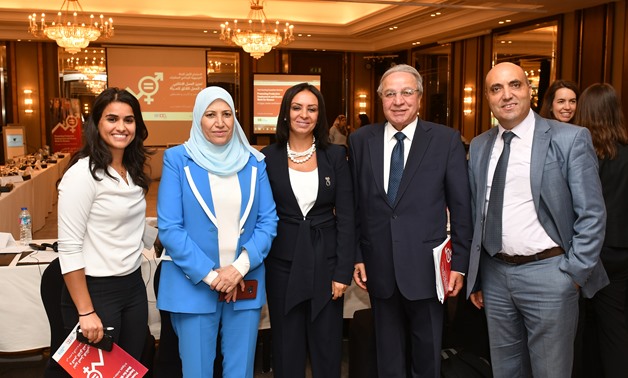
Maya Morsi and representatives of Jordan, Palestine, and international organizations in the launching of a joint programme titled “Promoting Productive Employment and Decent Work for Women in Egypt, Jordan, and Palestine." October 3, 2019. Press Photo
CAIRO - 8 October 2019: Chairperson of the National Council for Women (NCW) Maya Morsi along with high-profile representatives from Jordan and Palestine launched on Thursday a joint programme titled “Promoting Productive Employment and Decent Work for Women in Egypt, Jordan, and Palestine."
The programme is supported by the Swedish International Development Cooperation Agency (Sida) and implemented jointly by the International Labour Organisation (ILO) and UN Women. The programme targets to help women benefit from opportunities pertinent to better jobs, security at workplaces, equal access to professional development, social protection for families, better prospects for personal development and integration in society.

UN Women Special Representative Maryse Guimond
The meeting, where the programme was initiated, was attended by representatives of the aforementioned organizations as well as employers’ and workers’ organizations. At the meeting, ILO and UN Women officials presented the key findings of the inception phase that aimed to validate the programme’s approach and tailor its services to each of the three partner countries. Later on, discussions on the next steps in the programme to achieve its objectives took place.
The programme is expected to contribute to at least 12 reforms to the regulatory or legal framework which respond to and promote gender equality; support governments, employers, workers, CSOs, media, and academia to increasingly promote gender equality and women's empowerment, and help 2-5 percent increase of women in management positions in the public and private sectors. Moreover, the programme expects at least a 10 percent positive change in gender parity in staffing in the private sector, at least 87 new companies committing to implement gender equality policies in the Middle East and North Africa region through the Women’s Empowerment Principles (WEPs) as a platform to mobilize business action to advance gender equality and women’s empowerment at the workplace, marketplace and communities.
Chairperson of the NCW stressed the importance of awareness-raising as a key tool to promote equal opportunities for women and addressing the behaviors and customs that negatively affect women's ability to play an active role in society. She also stressed the importance of close cooperation and coordination with all stakeholders in each implementing country.
“Under the leadership of national institutions and together with ILO, Sida and other partners, we commit through this programme and others, to deliver on the promise of the first gender-equal generation in history - a generation with women and men equally contributing, and benefiting from, development and prosperity,” Regional Director of UN Women Arab States Moez Doraid highlighted.

Moez Doraid
“The programme represents a strong convergence of ILO and UN Women’s mandates by ensuring decent work principles are embedded into a framework for women’s economic empowerment. ILO’s Conventions represent not only commitment to gender equality in the world of work, but practical benchmarks and guidance on how to achieve this, whether it is legal protection, fair remuneration, parental leave, safety and health, childcare, or protection against violence and harassment at work,” Deputy Regional Director of ILO for Arab States Frank Hagemann said.
“Sweden’s investment in this programme comes from our strong commitment to achieve gender equality and women’s and girls’ rights and drives from our Swedish foreign policy to strengthen the economic empowerment of women and girls and their influence through the promotion of non-discriminatory legislation,” Head of Regional Development Cooperation in the Middle East and North Africa at the Swedish Embassy in Amman Peter Lundberg said.

Peter Lundberg
The joint programme contributes to Sweden’s new Strategy for development cooperation for global gender equality and women’s and girls’ rights 2018-2022; is fully aligned with the 2030 Agenda for Sustainable Development and the realization of the Sustainable Development Goals 5 and 8 on gender equality and decent work and economic growth. It contributes to the implementation of the Convention on the Elimination of all Forms of Discriminations Against Women, international labour standards, as well as national development strategies and plans, including the Sustainable Development Strategy: Egypt Vision 2030, Jordan 2025 – A National Vision and Strategy, as well as the Palestinian National Policy Agenda 2017-2022.




Comments
Leave a Comment